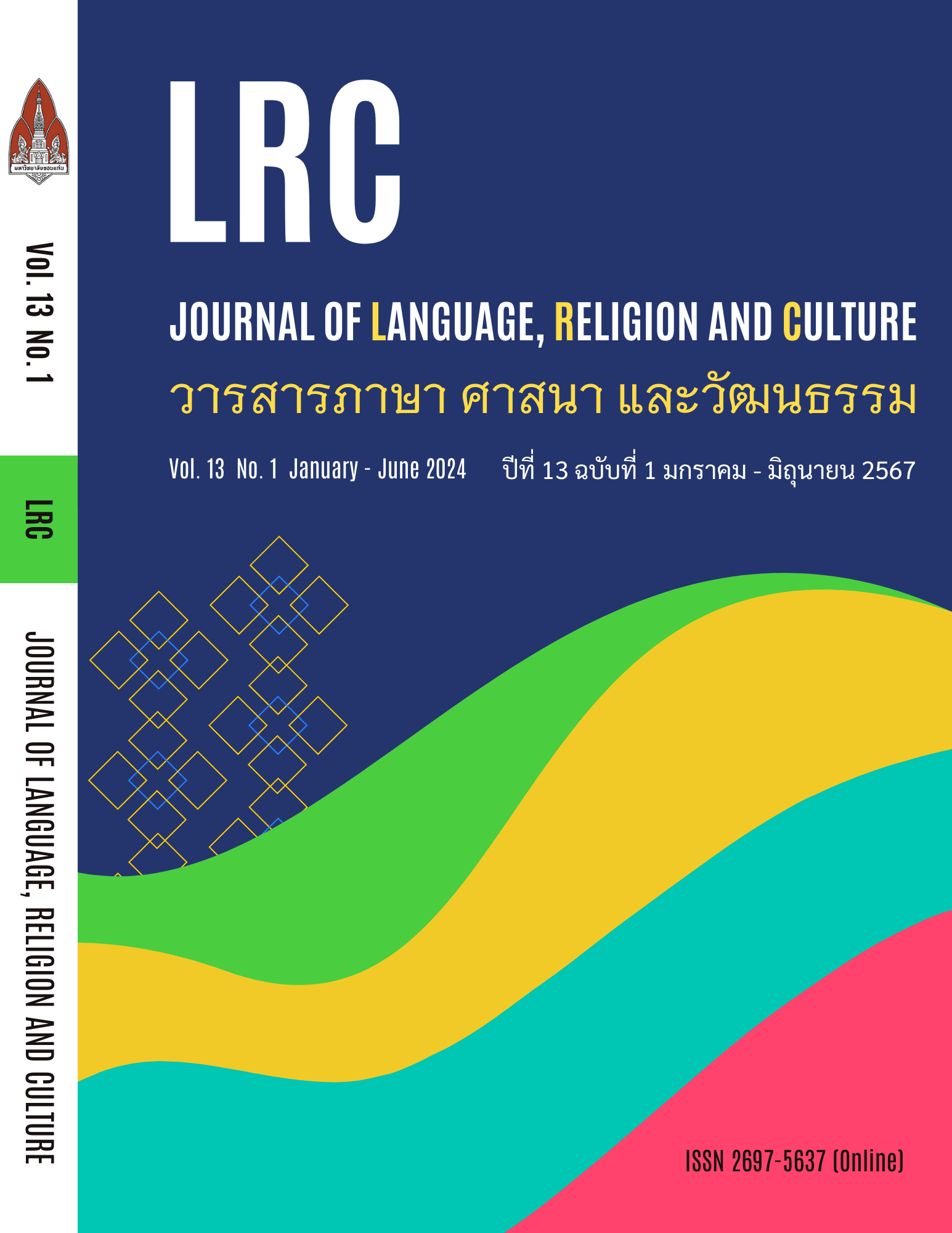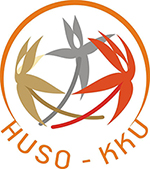The Basic Kinship Terms of the Yunnanese in Doi Mae Salong, Mae Fa Luang District, Chiang Rai Province
คำเรียกญาติพื้นฐานในภาษาจีนยูนนาน ดอยแม่สลอง อำเภอแม่ฟ้าหลวง จังหวัดเชียงราย
Keywords:
Yunnanese, Kinship Terms, Componential AnalysisAbstract
This article is a qualitative research aimed to study Yunnanese (Chin Haw) kinship terms used in Doi Mae Salong, Mae Fa Luang District, Chiang Rai Province, using componential analysis. Data was collected from five informants: two males and three females, aged between 28-60 years. The results revealed five components in the Yunnanese kinship term system: generation, sex, age, lineality, and parental side. As for the sociocultural aspect, the Yunnanese kinship terms used in Doi Mae Salong reflected the emphasis of the seniority system, as it was found that there are specific kinship terms for G+1 and G+2. Moreover, the Yunnanese kinship terms give importance to the paternal side and the male line, as seen in the G0 generation; the maternal side has only one combined kinship term for eight relationships, while more terms are specified for each relation on the paternal side.
References
Bennardo, G. (2016). Frames of reference and kinship terminology systems. Structure and Dynamics, 9(2). https://doi.org/10.5070/sd992032324
Brodbeck, F. (2019). Kinship terms in Ecuadorian Siona: A first analysis. Regensburg: Universität Regensburg.
Chao, Y. R. (1956). Chinese Terms of Address. Language, 32(1), 217–241. https://doi.org/10.2307/410666
Cheloh, A. (2009). A Comparative Study of the Phonology of the Yunnanese Chinese Spoken at Doi Mae Salong, Chiang Rai Province, Thailand, With Standard Chinese Phonology. [Master dissertation, Mahidol University]. Mahidol University.
Dousset, L. (2012). Understanding Human Relations (Kinship Systems). In: Nicholas Thieberger (Ed.): The Oxford Handbook of Linguistic Fieldwork. 4 Volumes. Oxford: Oxford University Press, p. 209–234.
Goodenough, W. H. (1967). Componential Analysis. Science, 156(3779), 1203–1209.
from http://www.jstor.org/stable/1721317
He, P. (2001). Yunnanese in Thailand: Past and Present. Journal Of the Siam Society,
(1&2), 40.
Jinakul, S. (2005). Perspective: ‘Lost army’ at home in the Mountains of Peace. Bangkok Post. p. P1.
Khahakitkoson, A. (2005). Comparison of kinship terms in Thai and Tae Chiu Chinese. Damrong Journal of the Faculty of Archaeology Silpakorn University, Vol. 4, NO. 1: January – June. From https://so01.tci-thaijo.org/index.php/damrong/article/view/21002.
Leonetti, D. L., & Chabot-Hanowell, B. (2011). The Foundation of Kinship. Human Nature, 22(1–2), 16–40. https://doi.org/10.1007/s12110-011-9111-y
Munro S. E. (1957). Kinship Terms and Kinship Concepts. American Anthropologist. 59, 393-433.
Nida, E. A. (1975). Componential Analysis of Meaning. Belgium: Mouton.
Nogle, L. (1974). 2. METHODS OF ANALYSIS. In Method and theory in the
semantics and cognition of kinship terminology (pp. 15-26). Berlin, Boston:
De Gruyter Mouton. https://doi.org/10.1515/9783111657738-003
Prasithrathsint, A. (2001). A componential analysis of kinship terms in Thai. Tai Linguistics.
-276.
Read, D. W. (2015). Kinship Terminology. In Elsevier eBooks (pp. 61–66).
https://doi.org/10.1016/b978-0-08-097086-8.53053-0
Sornsrisom, P. (2010). A Componential Analysis of Kinship Terms in Dara-Ang Language, Ban Nor-Lae, Monpin Sub District, Fang District, Chiang Mai Province. [Master dissertation, Mahidol University]. Mahidol University.
李倩. (2021). 云南方言亲属称谓词研究, 红河学院学报, 19(6). doi:10.13963/j.cnki.hhuxb.2021.06.019 [Li, Q. (2021). A Study of Relative Predicates in Yunnan Dialects, Journal Of Honghe College, 19(6). DOI:10.13963/j.cnki.hhuxb.2021.06.019]
明黎娟. (2018). 云南腾冲方言亲属称谓研究. [硕士学位论文, 吉首大学.], 吉首大学. [Ming, L. J. (2018). The Research on the Kinship Terminology of Yunnan Tengchong Dialect [Master dissertation, University of Jishou]. University of Jishou.]
袁方. (2007). 泰北美斯乐汉语云南方言调查研究. [硕士学位论文, 厦门大学.], 厦门大学. https://kns.cnki.net/KCMS/detail/detail.aspx?dbname=CMFD2008&filename=2008057317.nh [Yuan, F. (2007). A Study on the Yunnanese Dialects of Mae Salong Northern Thailand. [Master dissertation, Xiamen University]. Xiamen University.]
张映庚. (1995). 昆明汉族亲属称谓之探究, 云南师范大学哲学社会科学学报, 27(5). [Zhang, Y. G. (1995). Study of Kinship Terms in Han People' s dialect used in Kunming City, Journal of Philosophy and Social Sciences, Yunnan Normal University, 27(5).]
郑祖荣. (1986). 云南方言称叔为“爺”探考. 玉溪师专学报 (综合版), 4. [Zhen, Z. R. (1986). A study on Calling Uncle as “Ye(爺)” in Yunnanese Dialect. Journal Of Yuxi Normal College, 4.]
Downloads
Published
How to Cite
Issue
Section
License
Copyright (c) 2024 JOURNAL OF LANGUAGE, RELIGION AND CULTURE

This work is licensed under a Creative Commons Attribution-NonCommercial-NoDerivatives 4.0 International License.







